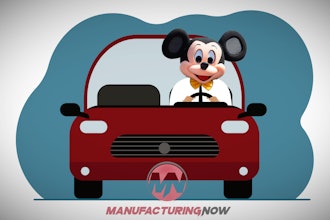Michiel Schipperus, CEO of integrated e-commerce provider Sana Commerce, spoke with Manufacturing Business Technology recently about the transformation of (B2B) manufacturing business. Schipperus discusses why B2B e-commerce is a way to respond to this transformation adequately.
Manufacturing Business Technology: Sana Commerce is a B2B specialist with many customers in the manufacturing industry. What are some of the trends you’ve seen during the past years in terms of the shift from offline to online?
Michiel Schipperus: We see customers demand more (product) information that is available at any time and in any place. Customers do not want to have to go through phone menus and listen to on hold music. They want to be able to do self-service. This is also driven by their online experience as consumers where they are used to an excellent online experience.
Manufacturers try to respond to this trend by bringing their catalog online. Now even
smaller and mid-sized businesses are looking into online sales. It's no longer just for the big boys. The big driving force in this development is the fact that great software products are becoming more affordable.
More and more industries are embracing online sales. In the past, B2B e-commerce started with computer hardware suppliers and distributors. But now we work for businesses in fashion, pharmaceutical products, tools and hardware, construction material, food, automotive parts and so on.
Manufacturers try to find ways to become more efficient. Especially in the sales and support departments a lot of efficiency can be gained. They spend a lot of time processing so-called traditional orders that come through phone, fax, e-mail and so on. But margins are getting smaller and therefore becoming more efficient is a must. That's why we see a large deal of manufacturers starting, or optimizing their online sales channel.
Manufacturers that have already setup their sales portal a few years ago are now looking to replace their current platform. This is because they have their e-commerce platform connected to their ERP through complex middleware. By now they have experienced this is complex and costly to maintain, also because of redundancy in the functions that are performed by the ERP system and the e-commerce platform. These companies now understand much better how important their ERP is for their e-commerce. That is why they are now looking for an integrated solution, where the ERP with the entire complex pricing rules will play a much more central role.
MBT: An online sales portal is soon associated with consumer goods. Many of our readers are dealing with complex and expensive products that are not suited to purchase online. Still you see many manufacturers add an online sales channel?
Schipperus: Yes we do. First of all we see especially for complex products that (business) customers prefer to inform themselves online before getting in touch with a sales representative. An online sales portal is therefore the right solution.
It is also a common misunderstanding that an online sales portal will completely replace personal contact with a sales representative. We see it as an additional channel in an omni-channel approach. We work for a lot of machinery manufacturers that do not sell their complex products online, but they do have a high traffic sales portal for spare parts that save them a lot of time in handling ‘simple’ orders.
MBT: For a large number of manufacturing companies, personally advising customers are a unique selling point. How is an online sales portal replacing this, highly valued, personal contact?
Schipperus: We see that our customers use B2B e-commerce as an addition to their current channels By definition not as a replacement. For the more ‘simple’ orders and customer inquiries, an online portal is a great solution. For more advanced (product) advice you still need your sales representatives. Our experience also tells u that manufacturers use an online sales channel as an information source to provide extra service for their customers.
We see that companies that added an online sales portal can save time on processing simple orders and requests. In turn they can spend this time on servicing their top customers better.
MBT: EDI is already implemented at a lot of manufacturing companies. Why would you then still invest in B2B e-commerce?
Schipperus: You should still invest in B2B e-commerce because EDI and an online sales portal serve very different purposes. EDI is used for large volume, frequent order placing, whereas an online sales portal is mostly used for placing orders with a more ‘occasional’ character. It provides a way to communicate with existing contact and improves the processes of frequently placed orders.
This efficiency is very valuable for manufacturing companies but off course manufactures want to expand. They want to get new customers, enter new markets and sell more products than the ones they are already known for. Therefore an online sales portal is an extra channel that comes on top of the existing channels.
Next to this you want to inform your customers about the products. If you compare it to EDI, e-commerce provides a way to provide more rich information about products. That’s why many of the manufacturers we work for have both EDI and an e-commerce solution.
MBT: E-commerce is not new. A great number of companies have already started an online channel. Why would you still think e-commerce would be trending for the coming years?
Schipperus: First, let me start by saying that I think this is a misunderstanding. Many manufacturers still don't have online capabilities, because they didn’t feel the need for it in the past. Now we see many of them starting to explore their options. Next to their need to become more efficient or to add revenue, the decision of starting an online sales channel is also based on the changing needs of (B2B) customers.
Like I said earlier, e-commerce is no longer just for the big boys. Smaller and mid-sized businesses are looking into online sales because great software products are becoming more affordable.
Next to this, we see a very large group of manufacturers that have installed a 1st generation e-commerce solution which now has to be replaced. These manufacturers have solutions without order functionalities or they have solutions that synchronize with their ERP and are therefore very vulnerable to errors. These kinds of e-commerce solutions can become a real challenge to maintain. Therefore we see many companies change to an e-commerce solution, which is integrated with their ERP system. With such a solution all ERP information is real time available in their web store and it also uses the 'business logic' of the ERP solution in place. This all makes typical manufacturing challenges like complex pricing structures no longer an issue.
Because of all these trends we can really say we are in the middle of the next generation of e-commerce. The one where the ERP will be seen as the starting point of online activities.






















